Monografie i podręczniki

Danuta Künstler-Langner,
Anioł w poezji baroku. Dzieje postaci w kulturze dawnej Europy,
Wydawnictwo Uniwersytetu Mikołaja Kopernika, Toruń 2007
Monografia przedstawia postać Bożego posłańca jako opiekuna, doradcy, mistrza medytacji i przewodnika do dobrych zaświatów. W kulturze duchowej baroku anioł - bohater liryki, epiki, kazań i mieszkaniec świątyni chrześcijańskiej - okazał się postacią wyjątkową w ziemskim i boskim uniwersum. Autorka przywołuje jego wyobrażenia i definicje w Starym i Nowym Testamencie, następnie pismach Pseudo-Dionizego Areopagity, św. Augustyna, św. Tomasza, św. Bonawentury i innych myślicieli chrześcijańskich, by spotkać się z nim w przestrzeni barokowych wierszy o dobrym życiu, przemijaniu, cierpieniu i poszukiwaniu raju.
This monograph describes the poetic world of angels in lyric poetry of the Polish and European baroque in the context of Judeo-Christian traditions. The authors of seventeenth-century poetic works depicted the existence of angels according to conceptions derived from the writings of the church and religious literature. This book seeks equally to describe the Divine messenger as it has appeared throughout the ages. It takes into account representations of positive spirits in the Old and New Testaments, in the apocrypha, in medieval eschatological visions as well as in ascetic mystical literature from the middle ages to the 17th century. A particular focus is the bonus angelus as the literary hero of ancient lyrics as well as of people's aspiration to gain knowledge of the sacrum. Polish poets of the baroque such as Mikołaj Sęp Szarzyński, Sebastian Grabowiecki, Kasper Twardowski, Zbigniew Morsztyn, and Stanisław Herakliusz Lubomirski introduced angels into their poetry in order through their mediation to draw near to Christ, to outline their vision of the future and urge their readers to choose the true path in life. The angel appears in ancient sonnets, songs, emblemata, threnodies, elegies, and the writings of monastic circles.
[Prof. dr hab. Danuta Künstler-Langner jest pracownikiem Instytutu Literatury Polskiej UMK.]
